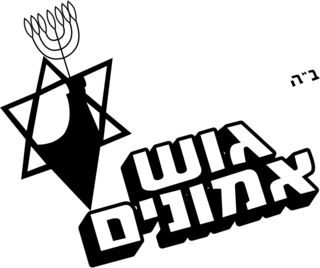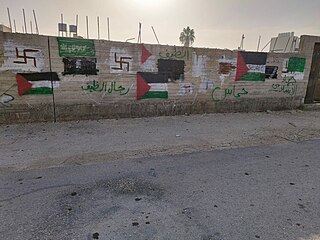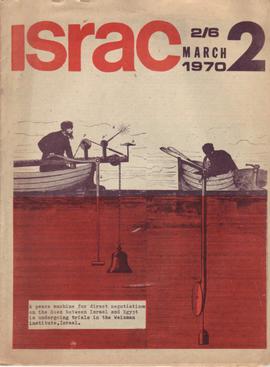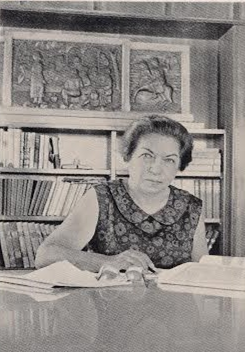Related Research Articles

Zionism is an ethnocultural nationalist movement that emerged in Europe in the late 19th century and aimed for the establishment of a national home for the Jewish people through the colonization of Palestine, an area roughly corresponding to the Land of Israel in Judaism, and of central importance in Jewish history. Zionists wanted to create a Jewish state in Palestine with as much land, as many Jews, and as few Palestinian Arabs as possible.

Haaretz is an Israeli newspaper. It was founded in 1918, making it the longest running newspaper currently in print in Israel. The paper is published in Hebrew and English in the Berliner format, and is also available online. In North America, it is published as a weekly newspaper, combining articles from the Friday edition with a roundup from the rest of the week. Haaretz is Israel's newspaper of record. It is known for its left-wing and liberal stances on domestic and foreign issues.

Gush Emunim is an Israeli ultranationalist religious Zionist Orthodox Jewish right-wing fundamentalist activist movement committed to establishing Jewish settlements in the West Bank, Gaza Strip, and Golan Heights.
Hilltop, outpost or lot 26, was an illegal outpost, consisting of a mobile home, founded by Netanel Ozeri outside Hebron in the West Bank. It lay approximately 100 metres (330 ft) from the Kiryat Arba settlement, in the Beqa'a valley. At the time of its destruction. Despite court orders, he kept expanding his outpost, refused to bullet-proof the caravan, fence the area he claimed in, or accept protection from the IDF.
The Safsaf massacre took place on 29 October 1948, following the capture of the Palestinian Arab village of Safsaf in the Galilee by the Israel Defense Forces (IDF). The village was defended by the Arab Liberation Army's Second Yarmuk Battalion.

Nakam was a paramilitary organisation of about fifty Holocaust survivors who, after 1945, sought revenge for the murder of six million Jews during the Holocaust. Led by Abba Kovner, the group sought to kill six million Germans in a form of indiscriminate revenge, "a nation for a nation". Kovner went to Mandatory Palestine in order to secure large quantities of poison for poisoning water mains to kill large numbers of Germans. His followers infiltrated the water system of Nuremberg. However, Kovner was arrested upon arrival in the British zone of occupied Germany and had to throw the poison overboard.
As an organized nationalist movement, Zionism is generally considered to have been founded by Theodor Herzl in 1897. However, the history of Zionism began earlier and is intertwined with Jewish history and Judaism. The organizations of Hovevei Zion, held as the forerunners of modern Zionist ideals, were responsible for the creation of 20 Jewish towns in Palestine between 1870 and 1897.

Akiva Eldar is an Israeli political analyst, author and journalist.

"A land without a people for a people without a land" is a widely cited phrase associated with the movement to establish a Jewish homeland in Palestine. Its historicity and significance are a matter of contention.

During the British rule in Mandatory Palestine, there was civil, political and armed struggle between Palestinian Arabs and the Jewish Yishuv, beginning from the violent spillover of the Franco-Syrian War in 1920 and until the onset of the 1948 Arab–Israeli War. The conflict shifted from sectarian clashes in the 1920s and early 1930s to an armed Arab Revolt against British rule in 1936, armed Jewish Revolt primarily against the British in mid-1940s and finally open war in November 1947 between Arabs and Jews.

Lords of the Land: The War for Israel's Settlements in the Occupied Territories, 1967–2007 by Idith Zertal and Akiva Eldar (ISBN 1-5685-8370-2) is a book explaining how Israel changed the demographic formula at the occupied territories through building more settlements on the lands of the occupied territories and forcing Palestinians to move away. It was first published in Hebrew by Dvir publishing house, Israel, 2005 as אדוני הארץ : המתנחלים ומדינת ישראל,? 1967–2004 / Adone ha-arets : ha-mitnaḥalim u-medinat Yiśraʼel?, 1967–2004.

The common definition of Zionism was principally the endorsement of the Jewish people to establish a Jewish national home in Palestine, secondarily the claim that due to a lack of self-determination, this territory must be re-established as a Jewish state. Historically, the establishment of a Jewish state has been understood in the Zionist mainstream as establishing and maintaining a Jewish majority. Zionism was produced by various philosophers representing different approaches concerning the objective and path that Zionism should follow. A "Zionist consensus" commonly refers to an ideological umbrella typically attributed to two main factors: a shared tragic history, and the common threat posed by Israel's neighboring enemies.

Events in the year 1945 in the British Mandate of Palestine.

Racism in the Palestinian territories encompasses all forms and manifestations of racism experienced in the Palestinian Territories, of the West Bank, Gaza, and East Jerusalem, irrespective of the religion, colour, creed, or ethnic origin of the perpetrator and victim, or their citizenship, residency, or visitor status. It may refer to Jewish settler attitudes regarding Palestinians as well as Palestinian attitudes to Jews and the settlement enterprise undertaken in their name.

The Battle of Tel Hai was fought on 1 March 1920 between Arab and Jewish forces at the village of Tel Hai in Northern Galilee. In the course of the event, a Shiite Arab militia, accompanied by Bedouin from a nearby village, attacked the Jewish agricultural locality of Tel Hai. In the aftermath of the battle eight Jews and five Arabs were killed. Joseph Trumpeldor, the commander of Jewish defenders of Tel Hai, was shot in the hand and stomach, and died while being evacuated to Kfar Giladi that evening. Tel Hai was eventually abandoned by the Jews and burned by the Arab militia.
The New Historians are a loosely defined group of Israeli historians who have challenged traditional versions of Israeli history and played a critical role in refuting some of what critics of Israel consider Israel's foundational myths, including Israel's role in the 1948 Palestinian expulsion and flight and Arab willingness to discuss peace. The term was coined in 1988 by Benny Morris, one of the leading New Historians. According to Ethan Bronner of The New York Times, the New Historians have sought to advance the peace process in the region.

Matzpen is the name of a revolutionary socialist and anti-Zionist organisation, founded in Israel in 1962 which was active until the 1980s. Its official name was the Socialist Organisation in Israel, but it became better known as Matzpen after its monthly publication.

The Nakba is the ethnic cleansing of Palestinian Arabs through their violent displacement and dispossession of land, property, and belongings, along with the destruction of their society and the suppression of their culture, identity, political rights, and national aspirations. The term is used to describe the events of the 1948 Palestine war in Mandatory Palestine as well as the ongoing persecution and displacement of Palestinians by Israel. As a whole, it covers the fracturing of Palestinian society and the long-running rejection of the right of return for Palestinian refugees and their descendants.

The Holocaust and the Nakba have been regarded as interrelated events in discussions of the Israeli–Palestinian conflict, both historically and in the way these two tragedies have influenced perceptions of the conflict by both parties. In Israel, all Israeli Jews are considered survivors of the Holocaust who must implement the imperative of never again in regards to being a Jewish victim. The uniqueness of the Holocaust is emphasized and linkage between it and the Nakba is often rejected. The 2018 book The Holocaust and the Nakba argues that "unless we can hold these two moments in our hearts and minds as part of the same story, there can be no moving forward in the seemingly unmovable conflict that is Israel-Palestine".

Bracha Habas was an Israeli journalist, literary editor and writer. She is being considered as “one of the first professional women journalists in Israel.”
References
- ↑ "Idith Zertal" . Retrieved 30 May 2019.
- ↑ Idith Zertal @ Fresh Fiction
- ↑ LeBor, Adam (2007-10-14). "Over the Line". The New York Times. ISSN 0362-4331 . Retrieved 2022-02-20.
- ↑ ""סירוב" של עדית זרטל: מדריך לסרבן המצפון, שיוצא באיחור של 20 שנה". הארץ (in Hebrew). Retrieved 2022-02-20.
- ↑ "Israeli petition supporting EU guidelines on funding of Israeli entities". European Coordination of Committees and Associations for Palestine. 2013-09-16. Retrieved 2022-02-20.
- ↑ LeBor, Adam (14 October 2007). "Lords of the Land - Idith Zertal and Akiva Eldar - Books - Review". The New York Times. Retrieved 30 May 2019.
- ↑ Brown, L. Carl (28 January 2009). "Lords of the Land: The War Over Israel's Settlements in the Occupied Territories, 1967-2007". Foreign Affairs . Retrieved 30 May 2019.